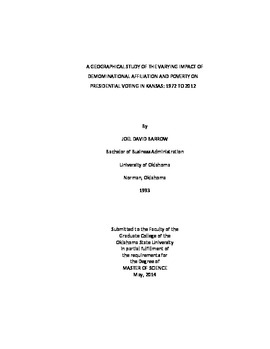| dc.contributor.advisor | Finchum, George Allen | |
| dc.contributor.author | Barrow, Joel David | |
| dc.date.accessioned | 2015-06-17T20:04:47Z | |
| dc.date.available | 2015-06-17T20:04:47Z | |
| dc.date.issued | 2014-05-01 | |
| dc.identifier.uri | https://hdl.handle.net/11244/14718 | |
| dc.description.abstract | This empirical study examines the claim made by political analysts such as Thomas Frank that, in Kansas, residents' presidential party affiliations are influenced more heavily by social issues than economic issues. A popular perception, which came to the forefront during the 2004 election cycle, is that lower income rural voters may be changing party affiliation due to identification with the Republican Party's stance on social issues. In this study, multiple regression analysis is utilized to evaluate the predictive force of both religious affiliation and poverty on voting habits in Kansas during Presidential elections in five survey years: 1972--2012. The data are grouped into four categories for each of the five survey years: liberal Protestant adherence, conservative Protestant adherence, urban county residence, and rural county residence. The independent variables are percent liberal/conservative Protestant adherence and percent of electorate at or below poverty level. The dependent variable is Republican presidential voting. The regression analysis results show that the conservative Protestant adherence data representing rural counties were the only consistent statistically significant predictors of Republican voting. The analysis indicates support for the contention that rural conservative Protestant adherents were influenced by social factors. The other variables were not significant predictors of Republican voting in any of the survey years, with the exception of the poverty data from the 1992 rural/liberal Protestant adherence regression. However, the results provide limited support for the contention that the influence of social issues, on Republican voting behavior, was a rural (versus urban or rural/liberal) conservative phenomenon. | |
| dc.format | application/pdf | |
| dc.language | en_US | |
| dc.publisher | Oklahoma State University | |
| dc.rights | Copyright is held by the author who has granted the Oklahoma State University Library the non-exclusive right to share this material in its institutional repository. Contact Digital Library Services at lib-dls@okstate.edu or 405-744-9161 for the permission policy on the use, reproduction or distribution of this material. | |
| dc.title | Geographical Study of the Varying Impact of Demominational Affiliation and Poverty on Presidential Voting in Kansas: 1972 to 2012 | |
| dc.type | text | |
| dc.contributor.committeeMember | Bays, Brad Alan | |
| dc.contributor.committeeMember | Hanks, Reuel | |
| osu.filename | Barrow_okstate_0664M_13303.pdf | |
| osu.accesstype | Open Access | |
| dc.description.department | Geography | |
| dc.type.genre | Thesis | |
| dc.subject.keywords | kansas | |
| dc.subject.keywords | politics | |
| dc.subject.keywords | poverty | |
| dc.subject.keywords | religion | |
| dc.subject.keywords | rural | |
